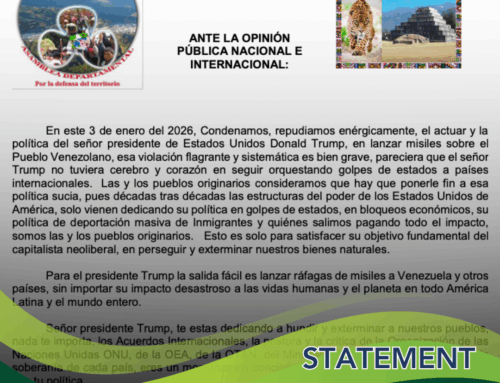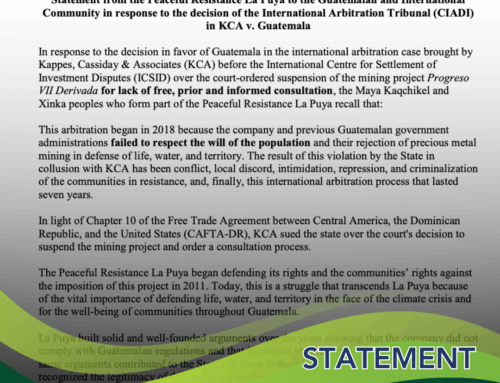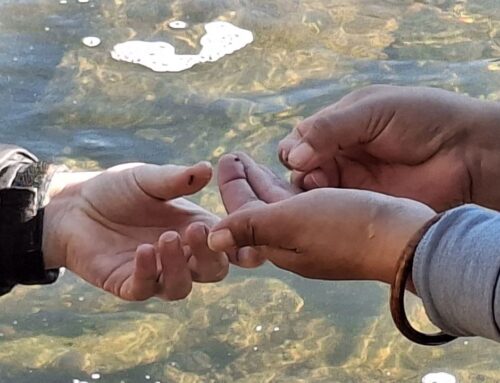July 7, 2017
(Oakland/Reno/Ottawa/Tatamagouche/Toronto) On Wednesday July 5, the Guatemalan Supreme Court of Justice announced that it was temporarily suspending two of Tahoe Resources’ mining licenses until a suit against the Ministry of Energy and Mines is resolved for discrimination and lack of prior consultation with Indigenous Xinka communities in the area of the company’s Escobal silver mine. Tahoe has consistently denied the presence of Xinka communities in the area of influence of the Escobal project and failed to report on the strength of opposition of both the Xinka and non-indigenous communities affected by its mining operations.
“The Xinka People have historically been made invisible by the Guatemalan State. Today, we are not surprised that a foreign company like Tahoe is using the same discriminatory mechanisms to negate our existence in the area to protect its investment. This is history repeating itself with the same goal as always: to displace our communities. Who are they to decide who I am and violate my right to self-determination? That is my right,” remarked Moisés Divas, Xinka community member and Coordinator of the Diocesan Committee in Defense of Nature (CODIDENA).
The two suspended licenses include the Escobal license where the large underground silver mine was built and operates in the municipality of San Rafael Las Flores. The second is the Juan Bosco exploration license in the municipalities of San Rafael Las Flores, Mataquescuintla, Nueva Santa Rosa, and Casillas. The latter three municipalities all held plebiscites prior to the granting of the exploitation permit for Escobal in which tens of thousands of people voted against any mining in their area. To date, opposition in Mataquescuintla has prevented the company from connecting its mine to the national energy grid.
Despite its denial of there being any Xinka people in the immediate area of its mine, Tahoe has stated in its response to the suspension Wednesday that it believes the Ministry of Energy and Mines (MEM) has already carried out a consultation process consistent with Indigenous rights.
In a communiqué dated July 6th, MEM argued that it has fulfilled all obligations under Guatemalan law through “dialogue with communities in the area of influence of the mine” and “establishing peaceful relations between communities and the mine since 2012.” It went on to state that the company’s Environmental Impact Study approved by the Ministry of the Environment in 2011, determined there was no Indigenous population in the region.
“The organized opposition to Tahoe’s project shows that whatever so-called consultation process the company and MEM may have carried out, they failed to obtain community consent. Tahoe has been telling shareholders for years that its social problems are taken care of, while treating people who are fighting for a healthy environment with open disdain. Clearly, given the month-long protest in Casillas, and the multiple ongoing legal cases in national and international courts, it hasn’t gotten everything resolved,” commented Becky Kaump for the Network in Solidarity with the People of Guatemala (NISGUA).
The Xinka Parliament and Xinka community members have consistently participated in community events and peaceful protests in opposition to the presence of mining in the region. As a result, like many others in the area, they have suffered violence and repression. In March 2013, four Indigenous Xinka leaders, including the then president of the Xinka Parliament, Roberto Gonzales, were abducted while returning from observing a community plebiscite in El Volcancito, in the municipality of San Rafael Las Flores. One of those abducted, Exaltación Marcos Ucelo, was found dead the next day. The United Nations High Commissioner on Human Rights has cited this as a killing of a human rights activist.
The Norwegian Council on Ethics, which investigated Tahoe’s human rights problems in 2014, noted that the Xinka and the Xinka Parliament “oppose the mining operation and demand that they be consulted before licenses are granted in the areas in which they live.” As a result of its investigation, the Council advised against any further investment in Tahoe Resources given the high risk of further human rights violations.
“With the support of Guatemalan national authorities, Tahoe has been wishing away the presence of Indigenous people around the Escobal mine since 2010 when founder and then CEO, Kevin McArthur, told participants at the Denver Gold Conference that the Escobal project would not face opposition because there were no ‘indigenous issues’. McArthur was just plain wrong about the absence of Xinka people or lack of resistance. Now the company and its shareholders are suffering the consequences,” commented Jen Moore for MiningWatch Canada.
On Thursday, Tahoe Resources lost a third of its value on the stock market. Two law firms have also announced investigations regarding claims that Tahoe violated sections of the U.S. Securities Exchange Act.
Concerned about the prevalence of criminalization, militarization and violence that opponents to the Escobal mine have experienced in recent years, national human rights organizations in Guatemala have publicly expressed support for communities and their legal support organizations, calling on the Ministry of Energy and Mines to uphold the sentence and refrain from using violence against peaceful protestors. International organizations are also urging the company and Guatemalan authorities to ensure that area residents and accompanying organizations do not face legal persecution, repression or violence for defending their Indigenous and human rights as a result of this suit and other recent protests, including a month-long demonstration in Casillas that prevented mine-related traffic from reaching the site.
Contacts:
- Lisa Rankin, Maritimes-Guatemala Breaking the Silence Network, (902) 615-0704, btscoordinator(at)gmail.com
- Caren Weisbart, Mining Injustice Solidarity Network, caren.weisbart(at)gmail.com
- Jen Moore, MiningWatch Canada, jen(at)miningwatch.ca, +613 722 0412
- Becky Kaump, Network in Solidarity with Guatemala, becky(at)nisgua.org +502 5575 2058
- Bob Fulkerson, Progressive Leadership Alliance of Nevada (PLAN), bfulkerson(at)planevada.org, (775) 348-7557





